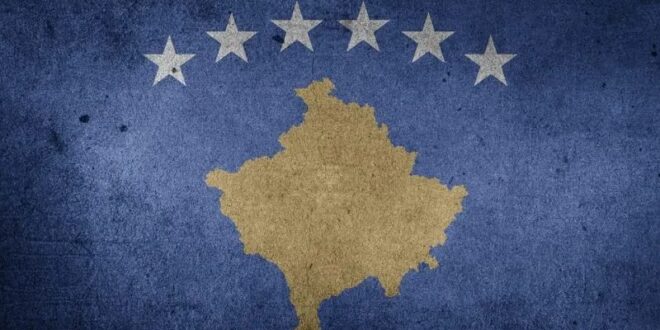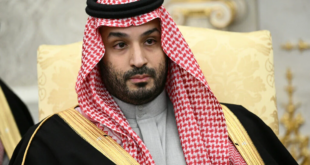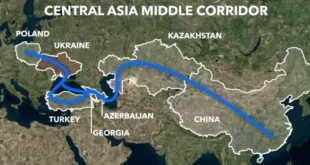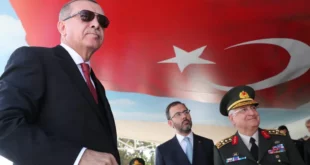The 17-hour war that took place in Banjska village of Zveçan, in the north of Kosovo, proves that Serbia is completely immersed in the obsession for the annexation of the north of the Republic of Kosovo.
Serbian President Aleksandar Vučić never seems to understand the fact that the independence of Kosovo does not depend on the political will of Serbia and the mythomania of the Serbian Orthodox Church on Kosovo, but above all on the political will of the citizens of Kosovo materialized with the declaration of independence on 17 February 2008, of course this is also in line with the strategic interests of the West, first of all the USA, Great Britain and Germany.
What did Belgrade claim to achieve with the terrorist action in the north?
Serbia’s purpose for organizing this terrorist attack was clear: to bring the second front of the war in Europe precisely to Kosovo, which would in any case restore the opportunity for Belgrade to once again bring the project for the division of Kosovo to the negotiating table through the so-called plan for the redefinition of borders between Serbs and Albanians. The scenario of this plan reminds me of the state terrorist act in the Panda cafe in Pejë during the KLA’s war for the liberation of Kosovo.
Through this scenario [which should really help western diplomacy to get out of the vicious circle of dialogue], it was foreseen with mathematical precision: some Kosovar Serbs attacked by the police had run to find salvation in the monastery. From there they had to resist together with the priests and monks who were brought from different parts of Serbia and former Yugoslav Orthodox areas.
In this confrontation, a dozen innocent monks and pilgrims would have to be killed anyway, to give the right alibi to the Serbian president for holding a fiery speech at noon, through which he would appeal to the world for intervention, before the march of the Serbian army, which was already deployed along the border. In the end, all that iconography with the slogan “When the Serbian army returns to Kosovo” was not done in vain. The operation of the Kosovo Police would anyway be characterized as an initiative of an ethnic cleansing that justifies the intervention.
But this Serbian scenario failed miserably. It failed thanks to the political prudence of Kosovo’s leadership and the organization of the powerful and highly professional response of our Police.
Surgical operation of police intervention
For a full century, the Albanians have faced Serbia many times, but until September 24 they had never faced each other as a state. The surgical operation of the Kosovo Police proved that Serbia should henceforth consider the confrontation as a confrontation with the state of Kosovo.
After this victory as a country on the battlefield, Kosovo must also face Serbia in the field of diplomacy.
Perhaps Serbian President Aleksandar Vučić, after the debacle he suffered on September 24 through a purely terrorist military action, needs additional time for reflection. But it seems that the meeting of his foreign minister Ivica Dacic on September 25 with the Russian ambassador to Serbia proves again the fact that he is already a hostage of the Russian KGB.
It is possible that until September 24, the Serbian president nurtured illusions that the EU, of course pushed by French diplomacy, wanted to accommodate Serbia at all costs by supporting its bleeding for the annexation of the Republika Srpska in Bosnia, also annexing the north of Kosovo and penetrating deep into Montenegro and turning it into a de facto Serbian Republic, is now completely illusory and counterproductive.
At the September 14 meeting in Brussels, the EU diplomatic duo did their best to trap Prime Minister Albin Kurti, presenting him as stated by the EU High Representative for Foreign Affairs, Josep Borrell, that Kurti “does not was ready to move forward”, already with the military experiment of September 24 in the north of Kosovo, Borrel will be forced to admit that it was and is precisely the Serbian president who “wasn’t ready to move forward” and urgently needed to created real obstacles to the implementation of the Franco-German plan that materialized in the Brussels Agreement on February 24, 2023.
Now, Vuçiqi must clearly understand that the recognition of the political reality created on February 17, 2008 is insurmountable. Finally, the Franco-German plan had this as its starting point. Meanwhile, Kosovo’s next step in terms of Euro-Atlantic integration will be its accession to procedures similar to NATO. Meanwhile, the final recognition of Kosovo by Serbia as an intention to be achieved only in stages based on the mutual steps taken by Belgrade and Pristina, can be described as being exceeded and without the real weight it had before September 24.
US Secretary of State Antony Blinken in his September 25 statement condemned what he called “a coordinated and violent attack” on the Kosovo police. But the rest of the statement remains completely unclear. What does he claim to achieve with a completely softened diplomatic attitude in relation to Serbia?!
While Mr. Blinken calls for restraint from actions and rhetoric that could fuel further tensions…and for a return to the dialogue process mediated by the European Union,[1] the president of Serbia, Aleksandar Vučić, meets with the ambassador of Russia in Belgrade, Aleksandar Bocan-Harchenko, even a day after the armed attack on the Kosovo Police in the north of Kosovo.
The time has come for Western diplomacy to understand that the Republic of Kosovo is the biggest compromise that the Kosovans have made in relation to the crucial issue in the Balkans, that is, the Albanian issue. Being generous in the process of declaring independence, the Kosovar side further made significant compromises, accepting the Ahtisaari Plan, through which the rights of the Serbian minority in the Republic of Kosovo were maximally accommodated. The intention to go further with compromises produced the agreement of April 19, 2013 and that of August 2015, which, as the Constitutional Court has found, completely defunctionalized the Republic, turning it into a second Bosnia in the region.
The next compromise, but very logical, is the one that is the basis of the Brussels Agreement [February 27, 2023], through which the Kosovar side renounces de jure recognition, agreeing to de facto recognition. Western diplomacy should appreciate this compromise, paving the way for Kosovo’s accession to international organizations and institutions.
For the Republic of Kosovo, in this case, its accession to NATO is of vital interest.
The historical alliance with Russia cannot be easily severed
The September 25 meeting of Vučić with the Russian ambassador [2] and the reaction of the Russian Foreign Ministry to the events in the north of Kosovo the day before, clearly suggest that Serbia’s long historical alliance with Russia cannot be easily severed, as illusions feed a large neighborhood of Western diplomats.
Post-war diplomacy blitzed for almost 17 hours in Banjska North of Kosovo on September 24, its real concern that Russia could use Belgrade to start a second war front in Europe was and remains real. This fear gains a kind of legitimacy especially now after the failure of this Serbian military action deeply coordinated with the Serbian Orthodox Church and, apparently, with Russia as well. This fear takes on real proportions, especially after the deepening of the fighting in Ukraine, when it is expected that military means of Western combat aviation, with which the Ukrainian army is equipped, will enter the battle.
The EU and the US remain very preoccupied with Putin’s project to destabilize
Balkans, that’s why they have made so many concessions to Belgrade, not only in relation to the sanctions against Russia, but also in relation to the Serbian appetites to somehow expand the Serbian demands, without even excluding the gradual realization of the “Serbian World”. This is the historical mistake that the West makes in relation to Southeast Europe today. It can only be compared with the concessions made to Hitler on the eve of the beginning of the Second World War in relation to the annexation of Poland!
The behavior of the leadership after the failure of the aggression of September 24, its declarations in the spirit of the leaders of ISIS that I will never recognize the independence of Kosovo, speak clearly that September 24 may simply be the first test for the clash of the century again between our two nations!
Last Wednesday [on September 26, through the video images made public by the Minister of Internal Affairs of the Republic, the presence of the main criminal and the leader of the action, Milan Radojicic, the vice-president of the Serbian List, was clearly demonstrated in this act of state terror. Meanwhile, one day later, on September 27, it was confirmed that one of the killed who was also a participant in that act, is Bojan Mijailović, the bodyguard of the head of the Serbian BIA, Aleksandar Vulin, who had accompanied the latter in his visit to the Republic of Kosovo in 2013.
Both Radojciqi and Mijailovic are sanctioned on the US blacklist. It is already known that they are among the closest people to the president of Serbia.
In the statement of the Minister of the Interior, among other things, it is affirmed that “these facts are another proof that Serbia’s intentions towards the Republic of Kosovo have not changed at all since the time of the Milosevic regime, the former Minister of Propaganda of that regime, now the president of the current regime In Serbia. Even the greatest optimists, who until now have lied to themselves about the changes in this country, I believe have been convinced of the opposite these days.”
A hot autumn is also warned by the Serbian media, which meanwhile swim in the river of anti-Albanian hysteria, like no other time in these 24 years after the war.
To prevent this from happening, the EU must withdraw from its obsessive objective of pulling Serbia into its orbit at all costs. It is foolish to assume that the EU’s efforts in this direction will not harm Kosovo and Bosnia, when things have already taken a clear picture.
Of course, the Albanians would like Serbia to move closer to the EU, as it would be better for Kosovo, as this would invariably lead to a more favorable atmosphere that would speed up the process of normalization between Kosovo and Serbia, as well as the recognition of the former by the latter. But the reality is that we are very far from that possibility.
Serbian foreign policy – a byproduct of Načertanija
The terrorist action in the north of Kosovo, organized and planned by the Serbian president himself, has done nothing but remove Serbia’s masks; he would have to bring Western diplomacy back to factual reality, enabling it to be recognized and accepted for what it is – a destabilizing factor in the region. The terrorist attack and the killing of an Albanian policeman, whose objective was the creation of chaos and the de facto division of the north of Kosovo, if not more, should be sufficient reason for reflection on the part of Western diplomacy.
The foreign policy of Serbia, since the beginning of the modern Serbian state, has been and remains closely related to its basic project – Načertanje [1844-1867], when under the leadership of the Serbian ideologist Ilija Garašanin, a working group was created within the Ministry of Ministry of Foreign Affairs of Serbia [1844-1853], which coordinated the activities of a network of agents, whose members would operate exclusively in the territories of neighboring countries that Serbia treated as areas of influence. [3] But the most pronounced crystallization of Serbian interests would be achieved by this working group in the second phase of Garasanin’s government [1861-1867], in which case two trends would be outlined that would leave traces in the entire history of the Serbian state until our days. The first stream focused attention on the West of Serbia, in Bosnia, while the second was focused on the south of Serbia, in Kosovo and Sanjak and Novi Pazar, as well as in Macedonia. This intensive work of this structure will reach the peak of its success anyway in 1878, which enters the history of the Serbian state as the period of the realization of the Serbian Code and the epochal historical turning point, since it would succeed in carrying out the first act of ethnic cleansing in the provinces of Nis and Kurshumli, Toplica and Vraj, baptizing these territories as “New Serbia”.[4]
The objective of this strategy was “the creation of a completely homogeneous national state.”[5]
Many elements of this strategy that this working group of the Serbian Foreign Ministry had applied in that world, have also been carried over to the last strategy for foreign policy [2020], which Belgrade applies, especially in Kosovo, through the Serbian List, together with the specialized units of the army, as he did in the last action on September 24, with which he claimed to create chaos in the north of the Republic of Kosovo and the alibi for a massive military march.
The Serbian doctrine on Kosovo remains strongly connected with Putin’s on Kosovo. Therefore, as such, the Russian doctrine should also be seen as an additional contribution that Russian neo-fascism offers to Serbia in its diplomatic battle to impose the reconfiguration of the political map of the Western Balkans in favor of Serbia, and therefore also of Russia.
The action of the special unit of the Serbian Army undertaken on September 24 is therefore part of this doctrine and was being prepared for a long time.
Some of the main components of Serbia’s doctrine and strategy for permanent enlargement are as follows:
1. The ethnic principle: Serbia has had a clear position on the protection and promotion of Serbian national and cultural identity. This aspect has included recognition and support of the Serbian population in other countries, including Kosovo and Bosnia, as well as aims to maintain historical, cultural and linguistic relations with the Serbian communities there. But, in addition to this, the assimilation of the Orthodox minority populations within the body of Albanians and Macedonians, as well as the so-called Gorans in the south of Kosovo and the west of Macedonia.
2. Political and diplomatic influence: Serbia has sought to influence the politics and diplomacy of neighboring countries through diplomatic relations, lobbying, and international cooperation. This includes efforts to gain support for their positions in international organizations and on the global stage.
3. European integration and regional influence: Serbia has expressed its intention to integrate into the European Union, including improving relations with the countries of the region and active participation in regional organizations, such as the Southern Cooperation Process Region. At the level of regional integration policies, Serbian diplomacy once invested heavily in the realization of the so-called Open Balkans project.
4. Stability and security of the region: Serbia has shown interest in supporting the stability and security of the Balkan region, promoting good relations with different countries and involving itself in dialogues and negotiations to resolve unresolved conflicts.
5. Economic cooperation and investments: Serbia has announced intentions to strengthen economic cooperation with various countries in the region, investing and developing joint projects that promote economic development and regional stability.In this context, Serbia preferred to invest in political Albania, while Kosovo in this context was more likely to be used and to be used in the future as a corridor.
It is important to note that the interpretation and evaluation of a country’s strategy, especially that of Serbia, is complicated and may vary according to different viewpoints and the global and regional context of a given period. For a long time, Serbia has known how to play between interest blocs and has been applying exclusively bipolar policies, maintaining strong economic ties, both with the East, first of all, with Russia, but also with the EU.
Reconfiguration of the approach to Serbia – necessity
Western diplomacy is well aware of this Serbian national strategy. It has been cyclically dealing with the application of its phases in the field for more than a century.
The time has come for her to reconfigure her approach. Vuçiqi, with this action, openly revealed the objectives of this strategy: the division of the four northern municipalities and the annexation of this part, which is considered the reserve of mining assets and the most vital part of Kosovo, if we also take into account Lake Ujman and Maja e Pançiqi. Vucic is de facto pretending to promote the frozen conflict in the north, hoping that Russian success in annexing parts of Ukraine, which they judge in Belgrade, will facilitate this objective.
In this precipitation of developments in Kosovo, the reaction of European diplomacy, specifically of the EU in the first place, should reflect with the freezing of accession talks, while the USA, as the American expert Daniel Server rightly states, should suspend military cooperation with Serbia, including cooperation with the Ohio National Guard.
But the reconfiguration of the behavior of Western diplomacy must be preceded by the correct attitude of the Prime Minister of the Republic of Albania and of the Albanian diplomacy itself.
Political scientist Bardhyl Mahmuti rightly asserts in his statement about this issue that “this aggression must be examined urgently within the Security Council, as the main responsible for maintaining international peace and security, and within the NATO Council , because “the fire that Serbia has ignited” risks involving at least three NATO countries, which are on the borders with Serbia”, whereas Prime Minister Edi Rama should take the initiative for this himself.
Mahmuti further underlines in his statement that “Prime Minister Rama’s reaction, through which he declares that Serbia is “fanning the flames of an armed conflict like never before since 1999”, is a dignified attitude for a head of a non-governmental organization!
The Prime Minister of the Republic of Albania should not be satisfied with the public demand that “the European Union and the United States raise the democratic alarm to the highest level to stop the escalation of the conflict in the north of Kosovo”, but Albanian diplomacy should be mobilized like never before. seen to prevent an explosion with unpredictable consequences!
Albania is a temporary member of the UN Security Council and a member of the NATO Council, as a political decision-making body of the North Atlantic Alliance. Being part of these most important security bodies, the Albanian state must alert the danger that Serbia presents to Kosovo and to the entire region!” [6]
The behavior of pre-modern diplomacy in relation to Serbia should go further, in fact it should be an example of the behavior of the generation of pioneer diplomats with Iraq after the American intervention. Last Sunday marked 20 years [2003], since the American president, George Bush, ordered the intervention in Iraq. American forces are still present in Iraq, not as enemy forces as they were in 2003, but as a party that has contributed to the process of state reconfiguration and peacekeeping in the region.
The changing situation in Bosnia-Herzegovina, but above all the one in Kosovo, these last two years, which are proving to be years of functionalization of the Republic, requires Serbia to make corrections to its historical course vis-à-vis the Albanians, gradually renouncing its claim to remain a central power in the region, as has become evident during the last decade, especially with the so-called Open Balkans project, which suffered a complete fiasco.
For Western diplomacy, the ambivalence of Serbia’s foreign and security policy has been evident, with an emphasis on defense and armament policy. Serbia is being systematically rearmed since 2014. In the eyes of the West, it was preparing for a new war with the Albanians.
After Russia’s annexation of Crimea, the Serbian leadership concluded that ground forces needed to be strengthened. Serbian defense spending between 2015 and 2021 increased by 70 percent to $1.4 billion annually. Serbia received ten MIG-29 aircraft, 30 tanks and armed personnel vehicles from Russia and Belarus, and also received an air defense system from Russia [7], according to public records dating back two years.
Armament stocks, meanwhile, are even larger. Consequently, Serbia has turned into a time bomb. Therefore, the complete reconfiguration of the position of Western diplomacy in the future of Serbia is an investment in its own future and peace in the region.
In Serbia, apart from many small groups and for this reason more difficult to define, there are three larger Romanian-speaking groups: Vlach, Bajeschi and Romanian (Sikimić 2014: 52).
The 2002 census recorded 40,054 people in Serbia who identified themselves ethnically as Vlachs. The majority belong to the Serbian Orthodox faith (OSBE 2008: 24).[8]
But as a whole they are estimated to be around 1 million Romanian speakers.
Internal federalization must be imposed on Serbia, recognizing the real political and territorial autonomy of the Hungarians in Vojvodina, the cultural autonomy of the Romanians and the political and territorial autonomy of the Albanians and Bosniaks in Sanjak [over 420,000 inhabitants] linked as a unique structure with that of Albanians in Presheva, Bujanoc and Medokë [about 100,000 inhabitants.
The internal federalization of Serbia and not the federalization of Kosovo, by imposing the Association of Municipalities with a Serbian Majority, is the key to the stabilization and prosperity of the region in the EU and NATO.
Endnotes:
- https://www.zeriamerikes.com/a/7282663.html
- https://www.balkanweb.com/nje-dite-pas-sulmit-ne-veri-te-kosoves-vucic-takon-ambasadorin-rus-ne-serbi-ja-cfare-shkruan-presidenti-serb/
- Compare: Dragoslav Stranjakoviq: Politika propaganda Serbije u Jugoslavenskim pokrajinama 1844-1858 godine, Beograd 1936, S.56, S.72 …
- The transition, respectively the translation of the name from “Novi Krajevi” as they were defined in the state terminology to “New Serbia” was made by the descriptor of the new geography by M.DJ. Miliević: Kraljecina Serbija – Novi Krajevi, Beograd 1844. For this connection of terminology see also Slobodanka Stojšić: Novi Krajevi Srbije 1878-1883. Drzavno-pravo i politiçko izjednaçenje novoslobodjenih krajeva sa doratnom Knezevinom Srbijom [Biblioteka Nardnog Muzeja u Leskovcu 20], Leskovac 1975, S.7
- Ditmar Mueller, Staatsbuerger auf Widerruf, Berlin, 2005, f. 122
- https://www.facebook.com/bmahmuti1
7.See: Matthias Herdegen / Ulrich Schlie: Geopolitische Machtverschiebungen im Balkanraum, Aktuelle Analysen nr 97, Muenchen 2023, S. 33
- https://www.gw.uni-jena.de/fakultaet/institut-fuer-slawistik-und-kaukasusstudien/arbeitsbereiche-und-einrichtungen/suedslawistik/exkursionen-soe/2017-exkursion-eisernes-tor-ostserbien/4-rumaenen-und-vlachen-in-serbien
 Eurasia Press & News
Eurasia Press & News




